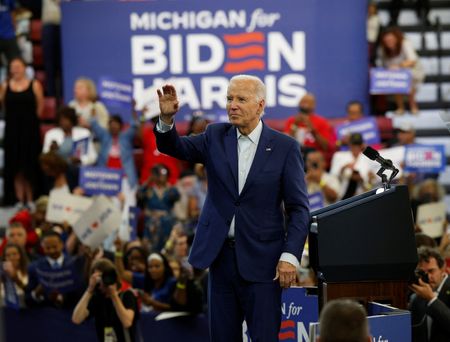By Jason Lange and Stephanie Kelly
WASHINGTON (Reuters) -President Joe Biden’s reelection campaign had a massive bank account when he dropped out of the race, but Republican candidate Donald Trump has mounted a legal challenge to Kamala Harris’ use of the funds for her White House run.
Biden, an 81-year-old Democrat who was in a tight race with former President Trump, endorsed Harris when he ended his reelection bid, and Harris quickly took control of Biden’s campaign accounts and has raced to lock up the Democratic presidential nomination.
HOW MUCH MONEY DID BIDEN HAVE?
Biden’s campaign reported to the Federal Election Commission on Saturday that it had $95 million in the bank at the end of June, a significant sum though less than the $128 million the Trump campaign reported to the FEC.
Since then, the Harris campaign has seen a surge in donations, saying on Wednesday it has raised $126 million since Sunday.
HOW DID HARRIS TAKE CONTROL OF BIDEN’S MONEY?
Immediately after Biden dropped out of the race, the campaign filed forms with the FEC scrubbing Biden’s name from registration documents and changing the official name of the presidential campaign account to “Harris for President” from “Biden for President.”
CAN SHE KEEP CONTROL OF IT?
The Trump campaign on Tuesday told the FEC the transfer amounted to a “brazen money grab.” But even if Trump’s legal challenge has merit, Harris is likely to keep control of the money, legal experts say.
Some campaign finance experts see merits to the challenge because Biden was the only presidential candidate during the fundraising.
“It was raised under his name,” said Charlie Spies, a prominent campaign finance lawyer for Republicans.
Saurav Ghosh, a lawyer at the Campaign Legal Center, a non-partisan watchdog group, said because Harris was already part of “Biden for President” as the vice presidential candidate, her claim on the money should be secure. “Anyone challenging the legality of this move has slim odds of success,” Ghosh said.
However, Spies and Ghosh agreed that election regulators would be unlikely to resolve the issue before the Nov. 5 presidential election.
WHAT ELSE COULD BLOCK A DEMOCRATIC NOMINEE FROM CONTROLLING THE MONEY?
Harris appears to be cruising toward the Democratic Party’s presidential nomination, but if her bid were derailed, a new Democratic ticket could only accept a few thousand dollars directly from the former Biden campaign account.
Harris would have the option of refunding contributions to donors or transferring an unlimited sum to the Democratic Party, which could spend the money supporting the party’s nominee. Not all of that spending could be coordinated with the nominee’s campaign, and the party might face higher costs than the campaign, which is legally entitled to heavily-discounted television advertising rates in the last 60 days before an election.
(Reporting by Jason Lange in Yucaipa, California and Stephanie Kelly in New York; Additional reporting by Jack Queen; Editing by Scott Malone, Rod Nickel and Alistair Bell)











